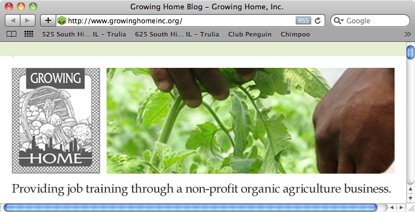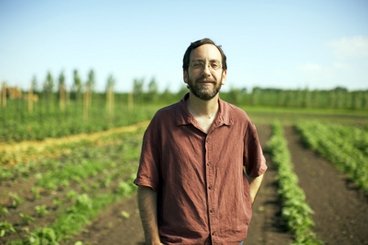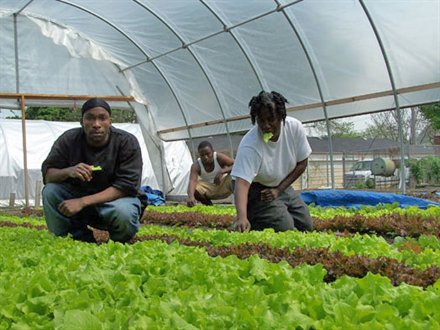
Earth Day at Growing Home on Chicago’s South Side might as well be just another day of trainees, workers and volunteers getting their hands dirty in organic soil in vacant city-owned lots.
But the non-profit will celebrate Earth Day by soon expanding its operations onto more city lots so it can harvest a greater bounty of fresh, organic produce for neighborhoods short on leafy greens — and broaden its training program, too.
In a novel deal, the city of Chicago is in the process of working out an arrangement to allocate an acre of land on a vacant city lot in Englewood to NeighborSpace, a local non-profit. The deal will allow Growing Home to work in that space for commercial use. NeighborSpace typically is awarded vacant city land in a public/private partnership to foster community gardening for nearby residents in neighborhoods across Chicago. In this instance, the parcel of land will be dedicated to Growing Home so it can boost its production and training capacity. The site is close to the near-half-acre tract Growing Home already occupies to farm organic greens in a series of hoop houses and in open ground.
The inside of a hoophouse at the Wood Street Urban Farm (image from the Growing Home blog).
When the group’s farmers begin planting in the new lot later in the growing season, they expect to eventually triple their revenues from the current output of red leaf lettuce, arugula, mustard greens, carrots and much more, says Harry Rhodes, executive director.
Growing Home is a social enterprise based in Englewood that’s focused on growing organic produce in Chicago neighborhoods lacking those foods, and training individuals who were previously incarcerated or homeless to gain farming skills. The organization has been around for a decade and is part of a movement attempting to fill gaps in the local food distribution system, especially in parts of the city considered food deserts. Growing Home also runs a 10-acre organic farm 75 miles southwest of Chicago in Marseilles.
Mr. Rhodes founded the program in 2001 after spending 16 years in Israel, where he organized programs to promote Jewish-Arab co-existence. Though he doesn’t describe himself as an urban farmer, Mr. Rhodes, 51, says he worked in date fields for about a year on a kibbutz in Israel and has a good feel for farming the land.
Next week, Growing Home will host its 9th annual fundraising benefit dinner at the Chicago Cultural Center, featuring local chefs Paul Virant of Vie and David Rosenthal of Inspiration Kitchens. They’ll be cooking local food to celebrate the organization’s efforts and put a little cash in its coffers. Tickets for the event are still available online.
Crain’s met with Mr. Rhodes to talk about Growing Home’s expansion plans.
Crain’s: What are the challenges of running an organic, urban farming business, especially with a social agenda attached to it?
Mr. Rhodes: Farming is not a very lucrative business and we have a different model of doing urban farming. One goal is to operate a sustainable, organic farming business that will cover its costs, bring in revenue and create new jobs.
Harry Rhodes
As a social enterprise, we use organic farming to help people transform their lives and bring about change in those communities where we’re working. We’re giving people who often have had doors closed on them in the past a second or third chance to get back into the work force.
We have less than a half acre on our Wood Street urban farm in Englewood and we’re almost maxed out in growing with the space we have. Last year, we brought in $45,000 in revenues, but our costs for the farm were $80,000 to $90,000. We’re trying to show people that urban farming can be worthwhile and sustainable, but we need to scale up our business. The next obvious step for us is to get more land.
Crain’s: Can you describe this innovative deal in the works with NeighborSpace that will give you more soil to grow more greens?
Mr. Rhodes: Across the street from our Wood Street farm is a vacant site owned by the city that’s almost an acre — twice the space we have now. The City of Chicago is working on giving the land to NeighborSpace — the first time they’re taking on an urban agricultural site — and they’ll own it as a land trust while letting us use it exclusively. This is the first time NeighborSpace will be used for commercial, urban farming. The city did the environmental testing of the soil and they’ve even agreed to put a clay cap on it (to prevent leakage of pollutants into the organic soil that’s laid on top for growing).
Tending crops at the Wood Street garden (photo from the website of Medill Reports Chicago).
We believe this model of creating a hub with additional sites nearby can grow our revenues without seeing much increase in our costs. This is a model that can be used around the country.
Crain’s: If you’re struggling with finances now, isn’t it tough to expand your operation?
Mr. Rhodes: It’s important for us to expand so we can create more jobs and become profitable. We have three full-time urban farmers, but the more land we have the more people we can train and hire. This growing season we’ll train 35 people in our program, up from 30 last year. In the next three years we hope to increase that to 45 people.
We’re seeing others in Chicago and around the country who want to replicate what we’re doing. One farm can have a huge impact on the whole movement. We’ve had people come from all over the country and even from other countries, including Japan, to see what we’re doing.
Crain’s: What other local developments are sprouting to encourage more urban farming in Chicago?
Mr. Rhodes: There’s so much going on in Chicago. In 2002, we started the Advocates for Urban Agriculture, a network of urban farmers for sharing resources and knowledge and working on policy issues. Initially, 10 to 12 people would show up at our meetings. About 120 people were at our last meeting a few weeks ago.
In Englewood, we have the Greater Englewood Urban Agriculture Task Force. One goal is to create a large number of farms in Englewood. We’re figuring out how to get land to people and intermediaries like NeighborSpace who can own the land and help us out. We’re coming up with a way to encourage small farmers to get involved.
If we could have an incubator developed, we could have 2-3 acres owned by a central body to lease out small plots to small business growers. In Englewood alone there are 300 vacant city plots. If we could have 30 farms on some of that land within 10 years, that would be amazing.
Crain’s: How does urban farming fit into your view of economic growth in Chicago?
Mr. Rhodes: In the big picture, we’re changing individual lives and entire communities. We’re using urban farming as a catalyst for community and economic development in underserved areas like Englewood. If we have one farm, we can train 45 people and have five jobs for urban farming. Then you’ll need businesses to sell the produce, maybe have a garden center and some restaurants that will cook with the local produce. The big goal of the Englewood task force is to change Englewood from a food desert to a food destination.




